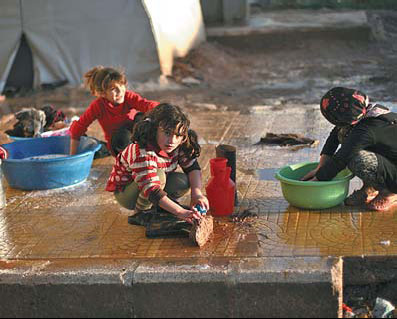EU takes aim at Syrian embargo
Updated: 2013-02-19 08:08
By Associated Press in Brussels (China Daily)
|
||||||||
|
Syrian refugee girls wash clothes in a refugee camp near Azaz, north of Aleppo province, Syria, on Sunday. Manu Brabo / Associated Press |
European Union foreign ministers are wrestling with the divisive issue of whether to ease the arms embargo against Syria so military aid can be funneled to the rebels fighting President Bashar al-Assad.
An EU official said Britain is lobbying to ease the embargo so munitions could flow, but only to the rebels. The official spoke on condition of anonymity because he was not authorized to discuss closed-door deliberations.
But several foreign ministers said on their way into the meeting that they were opposed to that.
That view was bolstered by a new report on Monday by a UN-appointed panel that said Syria's civil war is becoming increasingly sectarian and the behavior of both sides is growing more and more radicalized. The report urged the international community to curb the supply of weapons, and anti-government forces to part with foreign fighters.
Several foreign ministers said they were placing their hopes on the mediation efforts of Lakhdar Brahimi, the joint UN-Arab League envoy to Syria.
"There is no shortage of arms in Syria," Luxembourgish Foreign Minister Jean Asselborn said. "With more arms, there are more killed, more atrocities."
The UN says nearly 70,000 people have been killed in Syria's conflict since March 2011.
"We are convinced that a lifting of the weapons embargo would not be reasonable," said German Foreign Minister Guido Westerwelle. "This would only lead to a new arms race in Syria. This would mean a further escalation of violence with many, many more victims."
The British Foreign and Commonwealth office said in a statement that its objective remains a diplomatic solution. But the statement did not explicitly confirm or deny that the UK wanted the embargo altered to get arms to the rebels.
"The UK believes international action so far has fallen short," it said. "In the absence of a diplomatic breakthrough, it is right that we continue to consider all options to protect civilians and to assist the National Coalition and other opposition groups opposed to extremism."
Despite the violence, diplomatic efforts continue. Mouaz al-Khatib, the president of the opposition coalition, has said he would negotiate with representatives of Syria's governing party - though not with Assad or members of his security services. Brahimi, the international envoy, says that offer "challenges the Syrian government to fulfill its often repeated assertion that it is ready for dialogue and a peaceful settlement".
The report released in Geneva on Monday by the UN-appointed Independent International Commission of Inquiry on Syria made for alarming reading.
The commission, set up by the UN Human Rights Council, hasn't been able to enter the country and said that "significantly limited" its ability to investigate all alleged abuses - particularly those committed by armed anti-government groups. The report was based on 445 interviews with victims and witnesses.
"The war has become colored by sectarianism, permeated by opportunistic criminality and aggravated by the presence of foreign fighters and extremist groups," the panel said.
It said the number of foreigners fighting in the conflict has increased but still accounts for "a small proportion" of anti-government groups - though it remains hard to assess with accuracy their numbers.
It added that foreign fighters appear to come from countries in the Middle East, North Africa and Central Asia, "many from Libya, Tunisia, Saudi Arabia, Lebanon, Iraq and Egypt".
It urged anti-Assad groups to "detach themselves from the foreign fighters, particularly extreme elements that fail to comply with international human rights and humanitarian law".
The commission also found that the civil war "is becoming more militarized because of the proliferation of weapons and types of weapons used", with arms and ammunition smuggled across Syria's borders to anti-government groups on an increasingly regular basis.
It said government forces have increasingly used cluster munitions, but there was "no credible evidence" of either side using chemical weapons.
The panel also said it will submit a new, confidential list of Syrians suspected of committing crimes against humanity in the country's civil war to the UN high commissioner for human rights, Navi Pillay, next month.
(China Daily 02/19/2013 page12)

 In Photos: 7.0-magnitude quake hits Sichuan
In Photos: 7.0-magnitude quake hits Sichuan
 Li Na on Time cover, makes influential 100 list
Li Na on Time cover, makes influential 100 list
 FBI releases photos of 2 Boston bombings suspects
FBI releases photos of 2 Boston bombings suspects
 World's wackiest hairstyles
World's wackiest hairstyles
 Sandstorms strike Northwest China
Sandstorms strike Northwest China
 Never-seen photos of Madonna on display
Never-seen photos of Madonna on display
 H7N9 outbreak linked to waterfowl migration
H7N9 outbreak linked to waterfowl migration
 Dozens feared dead in Texas plant blast
Dozens feared dead in Texas plant blast
Most Viewed
Editor's Picks

|

|

|

|

|

|
Today's Top News
Live report: 7.0-magnitude quake hits Sichuan, heavy casualties feared
Boston suspect cornered on boat
Cross-talk artist helps to spread the word
'Green' awareness levels drop in Beijing
Palace Museum spruces up
First couple on Time's list of most influential
H7N9 flu transmission studied
Trading channels 'need to broaden'
US Weekly

|

|








